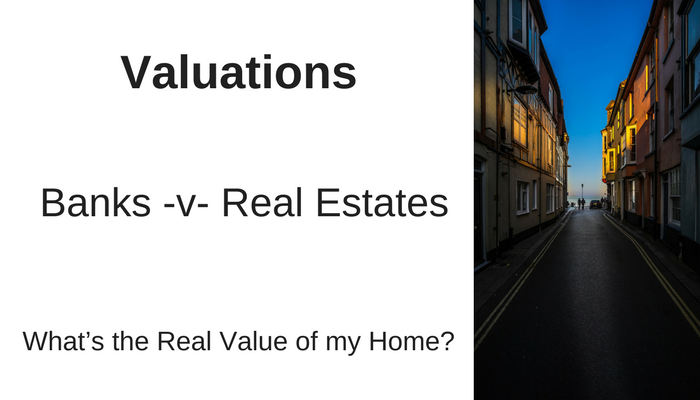 When you are buying or refinancing a house, why is it that the Bank’s Valuation can come in so different to the Real Estate’s Valuation? And how do I know what the real price is?
When you are buying or refinancing a house, why is it that the Bank’s Valuation can come in so different to the Real Estate’s Valuation? And how do I know what the real price is?
The Owners Price or Asking Price
Firstly, home owners have what is known as the “asking price” which can sometimes be over and above what the market – or what buyers out there – are willing to pay.
A Real Estate Agent wants to sell the property for the owner and may sometimes need to have the diplomatic conversation of… “You may want a million dollars for your home but according to all the data I can find, it is only worth around $800,000 at best.” When home owners are emotionally attached to their property, they may expect more because of the time and money they have put into it. It doesn’t however, mean that the asking price, is the real price or the market value.
The Agents Price
Real Estate Agents have access to data which provides information on properties sold, properties currently on the market and properties that you can compare your house too. For example, they can compare a 2 year old home with 4 bedrooms, 2 bathrooms, double lock up garage with a pool on a 500m2 block in the same street or suburb (or area) as your property. They are usually able to compare apples with apples to get a fairly good idea of what the property might sell for.
Sometimes, an Agent can inflate the price to get the listing so asking for a copy of the CMA (Comparative Market Analysis) is a good place to start. Do some of your own homework as well remembering that what is on Real Estate.com can be the “asking price” and not necessarily the “real value” or market value but, you can at least get some idea of the range that your property might sell for.
The Banks Price
If you have, or if you are getting a loan on your home, the bank or the lender will want to do their own independent valuation. The lender holds the house as security for the loan so if you are not able to make your payments or pay back the loan, they have the option to sell the property to pay the loan amount out. In this instance with the bank’s valuation, the bank wants to protect themselves as they are usually lending a substantial amount of money and they want to ensure that if the house does need to be sold, that the loan amount will be covered.
You may find that the valuation comes in lower than what the actual market value (or person who is buying the property) could be willing to pay. Bank valuations can be conservative estimates of the real value. In saying that, in some cases, the opposite can happen as well, and the valuation can come in higher than the estimated price.
The Real Value
The Real Value comes down to what the market or the buyer is willing to pay. You could even find in some markets that your asking price is $800,000, but buyers are willing to pay $850,000, and vice versa.
There is usually a range to gauge the value. For example, between the CMA from the Real Estate Agent, the Valuer’s opinion and your own homework on sales in the area, you should be able to work out the market value range, which could be between $800,000 and $850,000.
In summary, a valuation is not an exact science so to speak. Human opinion and experience – the risk profile used – likes & dislikes – interpretation of market forces – taste & colours, all influence the end value that one puts on a property… including professionals like Agents & Valuers.
This information is provided in good faith and is in no way provided as financial advice. It is up to you to make reasonable enquiry. Further, this information is up to date as at the time of writing and legislation and policies are subject to change at any time without notice.
